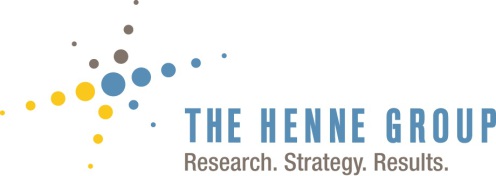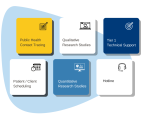
The Henne Group - Thriving at 35
How did you get your start?
From the early 1980s, I had worked with several firms on projects in San Francisco, and I felt it was a good time for me to start out on my own. My first clients were through my network of early colleagues. One of those colleagues had conducted much of the emerging market research on HIV. My work was varied – I did survey work for the Monterey Bay Aquarium and a real estate development project, for instance.
We take for granted all the easy connectivity we have now with the internet, mobile technology, and social media, but one of the things that made it possible for me to go out on my own was a fax machine, which was relatively new. In my earlier work we used teletype machines! So, with a fax machine and a handful of contacts, I started my own business from my dining room table.
By 1992 I was working on a large national quantitative study on HIV through UCSF. Out of that work a colleague of mine and I formed a small company called Survey Methods Group, which was separate from THG, a standalone data collection company. We had a half-dozen National Institutes of Health (NIH) projects in the 1990s related to HIV. Other early work that THG did was for the City of San Francisco that put us on the map for HIV related studies. The Henne Group focus-group tested the first Surgeon General’s brochure on HIV.
When the anti-retro-viral drugs came out in 1996, that began a clear demarcation for the AIDS epidemic towards HIV as a treatable chronic condition and re-focused the efforts of market research companies as well.
How has your work with HIV prepared you for other disease states?
The first work I did was with HIV, and it was the foundation of other work, helping to shape my client approach. There has been a thread of HIV work for the entire run of the company – from Ending the Epidemic projects for the CDC, to work on HIV treatment and HIV prevention with drugs like PrEP. My initial work in market research was in quantitative studies. I did my first focus group in 1984 with gay men.
Through these experiences, I learned I could recruit anybody and talk to anybody about anything. That’s when we expanded our work with rare conditions and diseases. We also worked with the pharmaceutical industry on chronic diseases like hepatitis or fairly rare sexual dysfunctions or prostate issues. The Henne Group became known for engaging hard to reach populations and speaking to those populations. More recently, our new partnership with MNW Consulting Group augments the strength we have in qualitative research.
What is the role that market research plays in helping to suggest a path forward? In other words, with HIV/AIDS or, in today’s world, with Covid, how has market research contributed to solutions?
Market research is key to understanding anything impacting human populations.
HIV was a profoundly stigmatized disease in the 1980s. Both the disease and the early disease population, by virtue of it striking gay men initially, was a highly stigmatized situation. Many stigmatizing factors were also present during the onset of the Covid-19 pandemic in the United States.
What’s the role of market research? At the end of the day, it’s just people talking to people. People listening. Certainly, in qualitative research, listening for the cues, listening to what’s most impactful, or bothersome, about a condition or a treatment for a condition. With honest feedback from a population, market research can make an intuitive leap or insight to a solution or value proposition for a potential client.
How has modern communications methods (internet, email, social media, mobile phones) affected how you recruit and reach people?
It’s easier to recruit and talk because it’s easier to reach. The reach and speed of all these channels have made it easier in some ways. But the challenge can be verifying who you are talking to? Who are in your surveys? The 1990s was the golden age of telephone interviews – samples were based on people who were reliably picking up their landline phones, often yielding a 60% response rate. That rate has slowly eroded as communication tools have evolved and become more fragmented and specific to certain demographics.
Having said that, mobile phone capabilities have also allowed us to reach people who may be at the margins – everyone has a smart phone. With online meetings, we have been able to continue to conduct focus groups virtually throughout the critical periods of the Covid pandemic.
What perspectives do you have on public health having conducted studies and worked on projects in the AIDS and now Covid epidemics?
The Henne Group has done quantitative research and hotline services for Covid. I have done quantitative and qualitative work for HIV. I have observed that in these public health crises there has been stigma associated with both diseases – with populations that could be at risk for either of those conditions. While these epidemics are very different in the causes and disease states, we have seen that these kinds of crises can engender stigma--i.e., for Covid how people may feel toward those who are vaccinated and how the vaccinated feel towards the unvaccinated.
The early years of HIV were terrifying, but we (gay men and our allies) did not let that fear impact how we treated each other. Once we learned it was transmitted. Once we knew how HIV was transmitted--that casual or even intimate interaction wasn’t going to transmit HIV--it didn’t impact how we interacted with each other as people. Because of the nature of Covid transmission, and the social shutdown it required before vaccines, I fear the impact that isolation will have on mental health and how we look at each other, even in our own communities and neighborhoods.
What are some of the hallmarks of The Henne Group’s evolution over the past 15 years?
Our “footprint” has certainly grown. By the early 2000s our team had grown, and we acquired our own office in San Francisco. In 2005, a valued colleague let me know about a program to bring business to Wyoming, and we applied and received a grant to open our offices in Greybull WY in 2005. This has also given us the opportunity to develop projects with more rural populations first in the West, but also and in the Deep South.
Our team and talent have also grown, and certainly we had to quickly adapt, like many organizations, to working remotely. We have utilized the tools of the digital age to thrive and serve our clients with quality.
So, what does the future hold for The Henne Group and research in general?
Who knows? I long ago stopped trying to live in the future, and I try my best every day to live in the here and now. I think the work that we’ve doing is more important than ever, and we’re doing a lot of important work in many different areas. Our team has grown from just a few to twenty to now over 70 people, and instead of primarily located in just San Francisco and Wyoming, our team members now reside all over the US. With technology advances, we even have team members living abroad!
I think one of the biggest lessons for us with the COVID-19 pandemic is that we as a company have been really blessed. At the beginning when we immediately lost 40% of our revenue, there were government programs put into place that helped us to survive. And then the work that we do was adaptable to a virtual environment. I think as we move through and hopefully beyond this pandemic, we’ll emerge even stronger, with many new tools to help us do what we do best – talk to people, listen to people, and provide actionable and concrete strategic solutions for our clients. And five years from now … what new tools will emerge? In THG’s lifetime we’ve gone from fax machines to … all that we have available today. Whatever the future holds, we’ll be ready for it!
Read More Articles:



